Issues
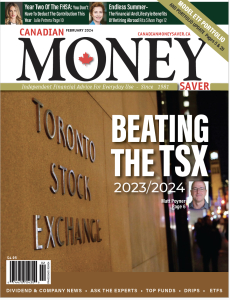
Last year once again reminded us of the importance of staying invested. The
market in 2023 started off strong, dipped, recovered, dipped again, then had a
big run in the fourth quarter.
Traders and short-investors likely had a very hard time: In 2023 one minute the world was
ending with high inflation, high interest rates and a looming recession. The next minute,
rates were falling, economists were talking about a 'soft landing' and all was good again.
But investors who simply held on, or, better yet, kept buying on a regular basis, likely
did very well in 2023. We enjoyed a solid 2023 performance, but a lot of it came in the last
nine weeks of the year, and the move was enough to make up for several mistakes (yes, we
still make those!).
So, as 2024 moves unrelentingly forward, keep this in mind: it is not timing the market,
it is time IN the market. Yes, a very old stock market saying. But, clearly, one of the best:
give your companies enough time to make you wealthy.
Peter Hodson CFA
Founder and Head of Research
5i Research Inc.
Featuring: Matt Poyner, Julie Petrera, Rita Silvan, Colin Ritchie, Chris White, Barbara Stewart, Michael Huynh
View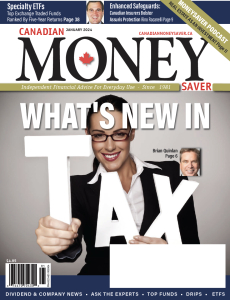
Happy New Year MoneySavers.
Did you enjoy 2023? There was, as always, lots of action in the capital markets, and
things did not look good in the early days, with interest rates rising and regional banks in
the US imploding on a daily basis. In March, some worried about a repeat of the 2008 financial crisis.
But strong job numbers, a recovery in corporate earnings, lower inflation and a belief that interest rates have peaked (not to mention a giant bitcoin rally) saved the day.
Going into 2024, confidence is coming back. There is $6 trillion in cash sitting on the sidelines. It might be a good year, but we know better than to make such predictions.
Don't change your investment strategy suddenly. Keep to your plan. You do have a plan, don't you? If you are thinking of buying a GIC, we might move faster than normal. In Canada, at least, with weaker economic growth, interest rates are likely to fall earlier and faster than rates in the USA.
And, don't forget to contribute to your TFSA, the best account for investors. The 2024 contribution limit is $7,000. Never bought a house? The First Home Savings Account is a hybrid of a TFSA and RRSP, and will help new home buyers with an $8,000 annual contribution, up to $40,000 lifetime.
Sharing With You,
Peter Hodson
Featuring: Brian Quinlan, Rino Ravanelli, Jason Heath, Donald Dony, John De Goey, Fred J. Masters, Barbara...
View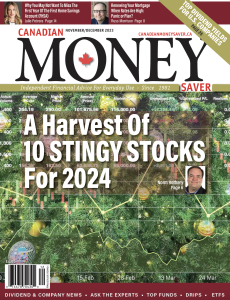
Well, there is good news and bad news this month.
Markets turned negative after July, as more fears of recession and higher interest rates took hold. It has now been nearly two years since investors started worrying about recession. Higher interest rates have worried investors for about as long.
The bad news is that negative momentum can easily carry through to the balance of the year. The TSX might have a hard time getting to a positive performance for 2023. Banks are universally hated right now, as investors worry about loan losses and a feared collapse in the housing market.
The good news is that higher rates do not always mean a bad stock market. Things could improve (no guarantees, remember!).
In 1980, the Federal Reserve funds rate went from 14% to 20% (not a typo), the highest rate it has ever been, as the US desperately tried to stop inflation. What did the stock market do that year? It went up more than 30% (including dividends). Perhaps the pervasive fear right now over 5% rates needs to be put into perspective a little bit.
As usual, no one knows the future. But history has shown that higher interest rates are not always so bad.
Peter Hodson CFA
Founder and Head of Research
5i Research Inc.
Featuring: Norm Rothery, Russ Morrison, Fred J Masters, Julie Peters, Richard Morrison, Ken Kivenko,...
View
In this month's issue, we highlight one of the most confusing topics for
investors: When to sell an investment.
Even the pros suffer with this. When a stock is going up, it is always nice to
take a profit. But should you? Why are other investors buying it?
When a stock is going down, it is never fun, but should you sell a losing investment?
What if it turns around and soars higher, or the company gets taken over?
Remember, someone sold Apple shares at (adjusted for splits) seven CENTS about
40 years ago (it is $183 at the time of writing). That clearly was not a good sell!
There is no perfect answer, but hopefully we will provide some guidance for your
next 'sell' decision.
Sharing with You,
Peter Hudson, CFA
Featuring: Richard Morrison, Rita Silvan, Ken Kivenko, Colin Ritchie, Ed Arbuckle, Solomon Amos, Barbara...
View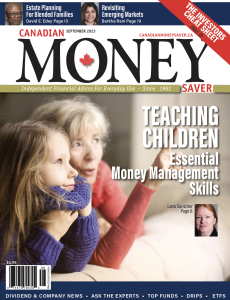
Sometimes, investors need to be careful what news items they pay attention to.
On any given day, there are thousands of news items, company reports, press
releases, analyst ratings and economic data points.
Not all are important. In fact, probably about 95% of them don't need to be read at all.
Unfortunately, though, knowing which ones to ignore is a skill that needs to be developed
over time. Ignoring 'noise' frees up an investor's time and is a big super power for an investor. Less noise equals more time means more 'real' research can be done.
Let's take an example. In early August, Fitch Rating Service downgraded the USA's credit
rating. On a slow news day, many investors panicked. 'If the US is in trouble', they reasoned, 'maybe I should sell some stocks and get defensive'. The news created a lot of buzz and a bit of a media frenzy.
But this item could have been completely ignored. A larger, more-respected ratings agency
(S&P Corp.) already downgraded the USA, MORE THAN TEN YEARS AGO.
A downgrade is not something a rating agency does lightly. I know, I used to work for a
ratings agency. But does this rating downgrade impact the average investor? Not really at
all. In fact, I am sure most investors wished they had loaded up on stocks ten years ago upon the initial downgrade.
Remember, just because an item is in the news doesn't mean you need to worry about it.
Sharing With You
Peter Hodson, CFA
Founder and Head of Research 5i Research Inc.
Featuring: Richard Morrison, Lana Sanichar, Davie Eden, Jason Heath, Rita Silvan, Milan Topolovec, Julie...
View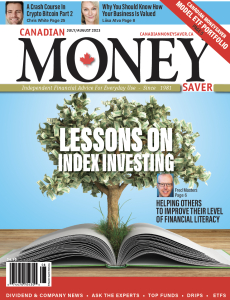
Itís July and summer is upon us. Many of us are winding down looking for a bit of sun and relaxation, hopefully near one of our beautiful Canadian lakes.
As I reflect back on the past 12 years of my time with Canadian MoneySaver, I recognize the changes that both I and the magazine have gone through.
When I first started with CMS, I knew nothing about the 60/40 split, or the dividend tax credit much less about how to invest in the stock market. I admit, my vocabulary has increased significantly and my familyís future is greater for it.
But I admit, as my husband inches increasingly closer to retirement, my worry about our childrenís financial future grows stronger. With the soaring costs of home ownership will they ever be able to afford their own homes? Will they be able to afford to raise a family? Or will they be able to afford many of the luxuries that we have become accustomed to? Without our help?
While the education system does include some financial literacy, the task is still largely left to parents. As a MoneySaver, I will continue to talk to talk to my children about money. Their future is in our hands.
Sharing With You,
Lana Sanichar, Editor - in - Chief
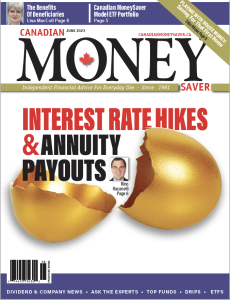
Do you ever get bored with your investments? Many investors do.
In fact, we see many investors who sell their stocks out of boredom.
But this, more often than not, is a big mistake.
Stocks donít go up in a straight line. Sometime they will go down. Often, they
will do nothing.
When bored, it is important to distinguish between a stock doing nothing and
a company doing nothing. Stocks do not always follow fundamentals. Sometimes
they are not even close.
Look at how your COMPANY is doing. If it is growing, paying down debt and
increasing dividends, then likely nothing is wrong at all.
Donít let boredom take you out of an investment that you should be sticking with.
Over time, boring stocks can often get higher valuations, because boring means
less volatility, and smart investors know this. Weak investors, on the other hand,
look for ďactionĒ.
Sharing With You,
Peter Hodson, CFA
Founder and Head of Research
5i Research Inc.
Featuring: Rino Ravanelli, Lisa MacColl, Colin Ritchie, Rita Silvan, Bent Gallander, Richard Morrison, Keith...
View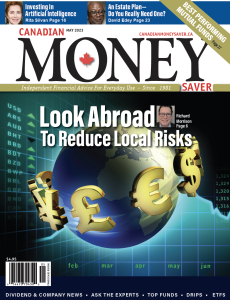
Well, finally the weather is getting warmer, at least here in Kitchener, Ontario.
Investors can start looking forward to a summer of BBQ's and vacations. In the 'old days' summers used to be very quiet in the investment business. It was hard for investment bankers to put deals together when everyone was on vacation. But no more. With technology keeping workers tethered 24/7, money now truly never takes a single day off.
But you don't have to be tied to your computer or phone. Are you comfortable with
your investments? Have you set up your asset allocation to meet your goals? Do you have
an investment plan? Are you diversified enough?
Take a cue from your portfolio: If you can't ignore your portfolio for at least two weeks,
and enjoy a stress-free vacation, you are probably doing something wrong.
Sharing With You
Peter Hodson, CFA
Featuring: Richard Morrison, Jason Heath, Keith Richards, Rita Silvan, Donald Dony, David Edey, Shiraz...
View
IF you have been even a casual reader of MoneySaver in the past few years, then you should know at least the basics of dollar cost averaging (DCA).
Dollar-cost averaging involves investing the same amount of money in a target security at regular intervals over a certain period of time, regardless of price. By using dollar-cost averaging, investors may lower their average cost per share and reduce the impact of volatility on their portfolios. In effect, this strategy eliminates the effort required to attempt to time the market to buy at the best prices.
It is amazing how DCA works in real life. When I was a fund manager earlier this century, we were encouraged to put money into our own funds. In fact, at some of the investment companies I worked at we were not even allowed to have a personal stock account. So, every month part of my pay cheque simply went into units of the fund I was managing. Then, along came the 2008/2009 Great Financial Crisis. Stocks plummeted, companies
went bankrupt, and people lost their homes. Yet, still, every month, I was buying. In 2010, when it was safe to come out from under my desk, I was surprised at how unscathed my portfolio was. We had just come through a giant market crisis, and my portfolio was in good shape. Why? Because I kept buying constantly. My $600 per paycheque bought more and more fund units each month as the market declined.
So, I did some math on 2022, which was another horrible year in the market. Suppose an investor bought $1,000 worth of SPY, the S&P 500 Index ETF, every month on the 15th, or if the 15th was a weekend or holiday, then the 14th. For this exercise we will assume there were no commission charges, which is true at several brokerages these days, especially for ETFs. With a DCA strategy last year, an investor would have lost 5.9% for the year. But that compares to a 19.5% loss for the market overall. Certainly a much better performance.
Even better, those extra units bought when the market was down really help when the market recovers, as it did in the first six weeks of 2023. Today, at the time of writing, the 2022 DCA strategy would see an investor already UP about 1% in total. Think about this. A DCA strategy in the third-worst year in 30 years is already in positive territory, less than two months into the year.
If that doesn't convince you that the strategy works, then nothing will. Perhaps it's time to implement regular buying and forget about timing the market.
Sharing With You,
Peter Hodson, CFA
Featuring: Chris White, Ellen Roseman, Jason Heath, Ken Kivenko, Rita Silvan, Richard Morrison, Barbara...
View
